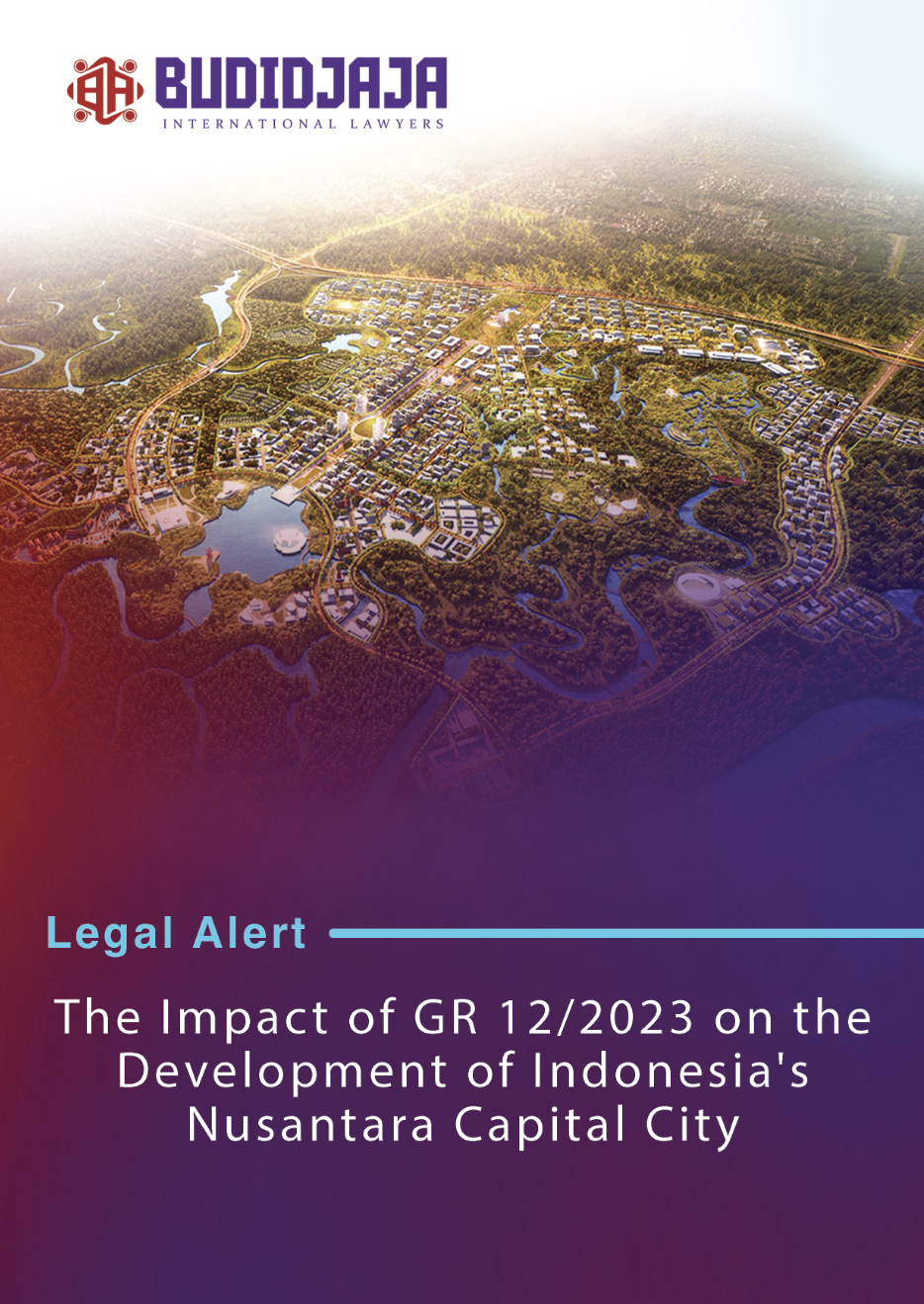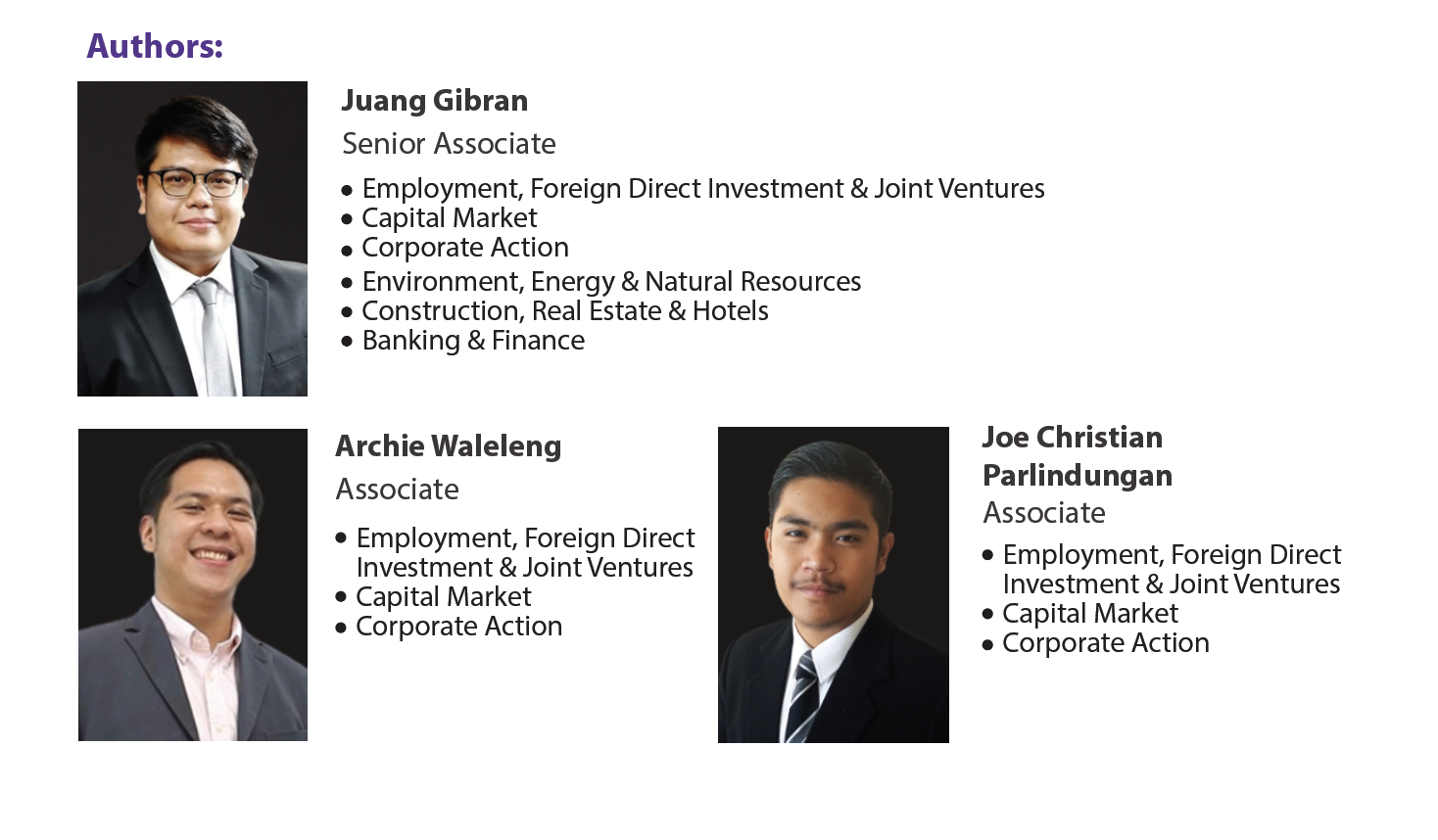

Introduction
The Indonesian government has issued Government Regulation No. 12 of 2023 regarding Business Licenses, Ease of Doing Business, and Investment Facilities at the New Capital City of Nusantara (Ibu Kota Nusantara/”IKN”) (“GR 12/2023”). This regulation, which came into effect on 6 March 2023, is focused on providing better assurance, opportunity, and participation for business actors in the context of accelerating the development of IKN as the new capital city, which will be located at Eastern Kalimantan and will play an important role in Indonesia’s economic development for the future.
- Business Licensing and Investment
a. Business Licensing and Capital Investment Activities
The cornerstone of GR 12/2023’s provisions is the revamped business licensing process within IKN and IKN’s superhub areas (“Partner Areas”).[1] It mandates that businesses aspiring to operate within IKN and the Partner Areas must secure their licenses issued by the IKN authority via the Online Single Submission System (“OSS”)[2]. What sets this approach apart is the simplified taxpayer status confirmation, which notably eases initial procedures for business.
A distinct and noteworthy provision is the exemption from foreign capital ownership restrictions. However, this leniency comes with a caveat – foreign investors are eligible for such flexibility only when collaborating with micro, small, and medium-scale enterprises or cooperatives[3].
- Ease of Business
a. Land Rights
The Lands in IKN are designated to either a State Asset or an Asset Managed by the IKN authority[4]. Lands that are managed by IKN authority are given Right to Manage (Hak Pengelolaan/”HPL”) in the name of IKN authority which can allocated to business actors. Business actors can be granted Rights over Land (Hak Atas Tanah/”HAT”) in the form of (1) Right to Cultivate (Hak Guna Usaha/”HGU”); (2) Right to Build (Hak Guna Bangunan/”HGB”); and (3) Right to Use (“Hak Pakai”)[5] above IKN’s HPL.
The allocation of these lands is subject to specific terms. These terms involve the formalization of agreements between the IKN authority and business actors, ensuring that the land’s status remains an asset managed by the IKN authority[6]. The maximum terms for each type of HAT are as follows:
| Type
Of HAT |
Period | Eligibility for New Cycle |
| HGU | First cycle, a maximum period of 95 years with the following stages:
1. Granting of rights, maximum of 35 years; 2. Extension of rights, maximum of 25 years; and 3. Renewal of rights, maximum of 35 years[7]. |
Yes |
| HGB | First cycle, a maximum period of 80 years with the following stages:
1. Granting of Rights, maximum 30 years; 2. Extension of rights, maximum 20 years; and 3. Renewal of rights, maximum 30 years[8]. |
Yes |
| Hak Pakai | First cycle, 80 years with stages:
1. Granting of Rights, maximum of 30 years; 2. Extension of rights, maximum of 20 years; and 3. Renewal of rights, maximum 30 years[9]. |
Yes. |
The extension, renewal and eligibility for a second cycle for the above HAT are subject to the agreement between the IKN authority and the business actor, the fulfillment of the stipulated criteria, and a joint evaluation by the IKN authority and the Ministry of Agrarian Affairs and Spatial Planning.[10]
It is also worth noting that the conferment of HAT in the formats of HGU, HGB, or Hak Pakai over HPL will incur a 0% Acquisition Duty of Right on Land and Building (Bea Perolehan Hak atas Tanah dan Bangunan/”BPHTB”) during a designated but unspecified timeframe. It is permissible to transfer, inherit, or encumber HAT with security rights after securing authorization from the IKN authority. Those receiving the transferred HAT will be subjected to a 0% BPHTB rate for a predetermined duration.[11]
b. Foreign Employees
In GR 12/2023, the government utilizes the existing foreign employee framework to harness the potential of foreign employees within IKN. Central to this framework is the requirement for approval of the Foreign Manpower Utilization Plan (Rencana Penggunaan Tenaga Kerja Asing/”RPTKA”). This approach facilitates the issuance of residence permits for up to 10 years with the possibility of extension, a key factor in fostering an environment conducive to attracting global talent[12]. Furthermore, foreign shareholders acting as directors would be allowed to stay during their occupancy[13]. A notable feature is the exemption of foreign employees from compensation fund payments, which undoubtedly enhances IKN’s attractiveness to both skilled professionals and potential employers.
- Investment Facilities: Introduction of Investment Incentives in GR 12/2023
a. Income Tax Reductions
A substantial reduction in income tax for resident taxpayers is at the heart of GR 12/2023’s investment landscape. This reduction spans various sectors, encompassing resident corporations investing in specific categories of businesses or infrastructure projects. The income tax reduction also extends to income generated from financial sector activities within the designated financial center area. The regulation also incorporates income tax reductions for resident corporations establishing or transferring head offices and/or regional offices, subject to specific criteria.
| No. | Benefit Description | Criteria | Reduction Percentage |
| i. | Income Tax Reduction for Resident Corporations in Certain Businesses or Infrastructure | Investment of at least Rp. 10,000,000,000.-[14] | Not specified |
| ii. | Income Tax Reduction for Financial Sector Activities in Financial Center Area | Type of financial activities[15] | Not specified |
| iii. | Income Tax Reduction for Resident Corporations with Central/Regional Offices | Two business entities outside Indonesia, economic substance in IKN, and Indonesian limited liability company[16] | Exemption for income earned from IKN office branch[17] |
| iv. | Gross Income Reduction for Work Practice, Internship, and Learning | Educational and development activities until 2023 | Max 250% of activity price[18] |
| v. | Gross Income Reduction for Research and Development Activities | Certain research and development activities | Max 350% of activity expenditures[19] |
| vi. | Gross Income Reduction for Charity or Public Facility Building | Building public facilities, social facilities, and non-profit facilities[20] | Max 200% of total charity/cost, except for legal obligations[21] |
| vii. | Income Tax Incurred by Government for IKN Residents | Employee living in IKN with taxpayer identification number[22] | Provided by the employer in cash[23] |
| viii. | Final Income Tax of 0% for Micro, Small, and Medium Businesses | Circulation of certain products, investment >Rp. 10,000,000,000.-[24] | Applicable for up to Rp. 50,000,000,000.-[25] |
| ix. | 100% Income Tax Reduction for Assignment of Land/Building Rights | First sale and purchase of land rights until 2035[26] | 100% reduction[27] |
b. VAT, PPNBM, and Customs Exemptions
GR 12/2023 introduces a strategic approach by providing exemptions for Value Added Tax (“VAT”), Sales Tax on Luxurious Goods (“STLG”), and customs duties. The regulation designates specific categories of strategic goods and services exempt from VAT, signaling a tactical maneuver to foster growth in key and strategic sectors. The regulation’s commitment to sustainable practices is evident in the VAT and STLG exemptions extended to renewable energy infrastructure. Additionally, the regulation underscores its investment orientation by exempting STLG on luxury occupancy groups for a defined period[28].
c. Special IKN Tax and Earnings Facilities
Furthermore, GR 12/2023 provides a pioneering element with the concept of special IKN tax and earnings facilities tailored to amplify the investment appeal of IKN. This provision introduces the potential for reductions or exemptions in special IKN tax and earnings, strategically creating an environment conducive to capital inflow. This innovation underscores the government’s commitment to nurturing economic growth within IKN.
Unless regulated explicitly in GR 12/2023, all tax facilities as stipulated in the tax laws and regulations, apply mutatis mutandis in the IKN. In the event that there are tax facility provisions based on GR 12/2023 that provide the same facilities as those applicable outside IKN and Partner Areas but with different benefits, the more advantageous tax facility provisions shall apply.[29]
d. IKN Facilitation
Recognizing the pivotal role of investment facilitation, GR 12/2023 emphasizes the importance of streamlined processes. The IKN authority is empowered to provide critical elements such as land and location, thus simplifying investors’ access to suitable sites. Moreover, the regulation underscores its commitment to infrastructure development, recognizing it as a cornerstone for long-term business growth. The emphasis on investment comfort and safety underscores the government’s dedication to creating an attractive investment environment. Lastly, the regulation acknowledges the importance of ease of access to a skilled workforce, thus solidifying IKN’s position as an investment destination of choice.[30]
Closing Remarks
In conclusion, GR 12/2023 marks a significant stride towards propelling the economic development of IKN. By focusing on strategic dimensions such as business licensing, approach to land rights, facilitation of foreign employees, and investment incentives, the government sets the stage for accelerated growth and global competitiveness.
GR 12/2023 introduces a paradigm shift in the licensing process within IKN, ushering in a streamlined approach and flexibility in foreign capital thresholds. This showcases the government’s commitment to fostering inclusivity and innovation, particularly in collaboration with micro, small, and medium-scale enterprises or cooperatives. Moreover, the regulation presents a robust framework for land rights within IKN, ensuring that businesses are provided with structured land ownership under various categories that grant secure land access and incorporate mechanisms for renewal and transfer, adding a layer of stability to investment endeavors.
The facilitation of foreign employee utilization and the strategic exemption of compensation fund payments highlight the government’s proactive stance in attracting global talent and encouraging skilled professionals to contribute to IKN’s growth. The flexible approach to housing projects and incentives like income tax reductions and VAT exemptions further solidifies IKN’s allure for investors and businesses.
Emphasizing investment facilitation as a cornerstone, GR 12/2023 places the IKN authority at the forefront of providing crucial resources, infrastructure, and a conducive environment for business activities. By prioritizing ease of access to a skilled workforce, the regulation underscores its dedication to creating an environment primed for innovation and development.
In the grand vision of Indonesia’s new capital city, GR 12/2023 emerges as a comprehensive guide that not only streamlines processes and incentivizes investments but also envisions a future where economic growth, sustainability, and global collaboration thrive within the vibrant heart of IKN.
*****
[1] Pursuant to Art. 1 No. 7 of GR 12/2023, Partner Area is defined as certain areas on the island of Kalimantan that are formed for the development of the Nusantara Capital City economic superhub, which cooperates with the Nusantara Capital City Authority, and is determined through a Decree of the Head of the Authority. Nusantara, and determined through a Decree of the Head of the Authority.
[2] GR 12/2023, Art. 4 para. (3)
[3] Ibid., Art 5-6.
[4] Ibid., Art 16 para. (1)
[5] Ibid., Art 17 para. (1).
[6] Ibid., Art 17 para. (2)-(4)a
[7] Ibid., Art 18 para. (1)
[8] Ibid., Art 19 para. (1)
[9] Ibid., Art 20 para. (1)
[10] Ibid., Art 18-20
[11] Ibid., Art 21
[12] Ibid., Art 22 para. (2)
[13] Ibid., Art 23 para. (3)
[14] Ibid., Art. 28 para. (2)
[15] Ibid., Art. 32 para. (2)
[16] Ibid., Art. 35 para. (2)
[17] Ibid., Art. 35 para. (4)
[18] Ibid., Art. 42 para. (2)
[19] Ibid., Art. 44 para. (2)
[20] Ibid., Art. 45 para. (1)
[21] Ibid., Art. 45 para.(2)
[22] Ibid., Art. 50 para.(2)
[23] Ibid., Art. 50 para.(5)
[24] Ibid., Art. 56 para.(1)
[25] Ibid., Art. 56 para.(2)
[26] Ibid., Art. 57 para.(4)
[27] Ibid., Art. 57 para.(2)
[28] Ibid., Art. 59
[29] Ibid., Art. 72
[30] Ibid., Art. 68
